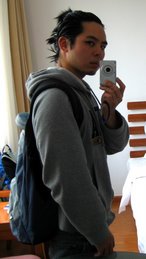Saturday, April 29, 2006
Student Profile #6
There is, contrary to what the overwhelming majority of students of the SAT will say if prompted, a diverse selection of reading passages on the Reading Comprehension section, many of which contain diverting and enlightening excerpts. For example, I have learned that:
The Navajo people value sandpaintings not for their aesthetic qualities, but as instruments of healing;
some jazz purists object to Miles Davis' experimental fusion of jazz with acid rock in the 1970s;
women travelers in the 1800s spawned a cottage industry in publishing their travel accounts by appealing to other, stationary women's wanderlust; and
early American film was unflinching in its portrayal of crime and social immorality.
In addition, I have skimmed excepts or critiques of Willa Cather's Sapphira and the Slave Girl, Joyce's Portrait of the Young Man as an Artist, a spattering of Jane Austin novels, and short stories by Mark Twain.
Unfortunately, as alluded to above, my students don't share my appreciation for the knowledge to be gained from the reading passages. Not only do they find the reading selections sadistically boring, but they have the added burden of using the excerpted material to answer questions about the tone, implied meaning, and other subtleties of the works in question.
There has been a perceptible shift toward readings about Native American culture and experience (e.g. the piece on Navajo sandpainting) (doubtlessly this trend stems from allegations that the SAT is somehow biased against minorities, women, &c, &c). Not surprising then, was the fact that among the passages slated for today's instruction was one on the contributions Native Americans to our society. To give some background on the passage, I thought it would be useful to mention ways we have benefited from the Native Americans:
"The pilgrims learned efficient methods of growing maize from the Indians; many historians attribute the early settlers' survival of the first winter to Indian assistance. During World War II, the Allies relied on the Navajo language as an indecipherable code which neither the Japanese nor the Germans could break. Their ecological consciousness and symbiotic relationship with nature have influenced modern ideas of sustainable development. Moreover, their multifarious languages, art, music, and dance have enriched American and world cultures."
At this point, Brian (the ostensible subject of this entry) added, "And they gave us casinos."
Sigh...yes, to what indeed would the whole of Western culture and civilization amount, if not for the wonderful world of Indian gaming and casinos?
Thursday, April 27, 2006
The soul of wit[?]
hi JT. can you translate these two sentences to reflect your most complicated and sophisticated use of diction?
FIRST VERSION: "Can you imagine how bad my mother will look if I'm wearing cubic zirconium on my finger?!?! Oh dear, I can't imagine the hideous thoughts that would circulate through the minds of the upper middle class!"
SECOND VERSION: "Could you possibly begin to fathom what vicious thoughts would be directed towards my mother if I were to possess the most worthless imitation of precious stone on my phalanges?!?! My goodness, I can not even comprehend the treacherous repercussions that would ensue and conversations of travesty that would prevail amongst the bourgeoisie surrounding our commonwealth!"
can you give me your version?
***** ***** ***** ***** ***** *****
I suggested:
"Can the mortal mind--though noble in reason, superior in faculties, god-like in apprehension--conceive the social disgrace and utter derision that would be strewn upon my mother (like so many rocks thrown during the stoning of an adultress!), should the spectacle of a counterfeit gemstone upon my hand be brought before public scrutiny? Heavens to Mergatroid, to apprehend the severity of malevolence and sheer disapprobation of the assumptions that would form in the minds of high brow society is not within my cerebral faculties!"
[Complete with a literary allusion to Hamlet, and allusion to classic Hannah-Barbera cartoon.]
I thought it was an interesting exercise, and was curious to see what other variations my friends might put forward. Their responses led me to question the degree to which they understood that the governing instruction was to make the sentence as circuitous and verbose as possible:
David: "Man, this sucks"
Pam: "I'm vain and ungrateful"
Eddie: "Let's elope with ring pops." [Ring pops jokes have been popular with my friends of late...]
Pam wins. :)
Friday, April 07, 2006
Daffodils
 To many, the blooming of the daffodil incontrovertibly signals the arrival of spring. Here are some photos of the cheerful faces that recently emerged from bulbs I planted just this Februrary.
To many, the blooming of the daffodil incontrovertibly signals the arrival of spring. Here are some photos of the cheerful faces that recently emerged from bulbs I planted just this Februrary.In decades past, one of the most widely memorized poems was Wordsworth's "I Wandered Lonely as a Cloud," referred to many laypeople as simple "the daffodil poem." Unfortunately, inculcating the delightful, tetrameter couplets into the minds of grammar school students made the task seem rather like drudgery, rather than a pleasure, thus making the piece among the most dispised in all of English verse.
Perhaps this is why the exercise was dropped, so that only teachers who have a living memory of the second World War--those fundamentalist, exacting guardians of tradition in education--still insist upon the practice. And thus it is hard to say which would be preferrable: to fill the young, impressionable minds of grammar school students with quality poetry that could be recalled and pressed into service later in life, but taint the verses with contempt; or to allow some of our language's most valuable treasure to fall into general oblivion, with the hope that a handful of citizens would, one day, extracurricularly discover and learn to cherish them.
Wordsworth's poem was originally composed in 1804, two years after he viewed the "host of golden daffodils" on a walk with his sister Dorothy, who recorded the incident in her journal entry for 15 April 1802:
"I never saw daffodils so beautiful; they grew among the mossy stones…some rested their heads upon these stones as on a pillow for weariness and the rest tossed and reeled and danced and seemed as if they verily laughed with the wind that blew upon them over the lake….”
Here is the second version (published in 1815) of the poem:
I wandered lonely as a Cloud
That floats on high o'er Vales and Hills,
When all at once I saw a crowd,
A host of golden daffodils;
Beside the lake, beneath the trees,
Fluttering and dancing in the breeze.
Continuous as the stars that shine
And twinkle on the milky way,
They stretched in never-ending line
Along the margin of a bay:
Ten thousand saw I at a glance,
Tossing their heads in sprightly dance.
The waves beside them danced, but they
Out-did the sparkling waves in glee:-
A poet could not but be gay
In such a jocund company:
I gazed-and gazed-but little thought
What wealth the show to me had brought:
For oft when on my couch I lie
In vacant or in pensive mood,
They flash upon that inward eye
Which is the bliss of solitude,
And then my heart with pleasure fills,
And dances with the Daffodils.

Tuesday, April 04, 2006
Angels in America
"Could you spare some change for so I can catch the bus? Could you spare some--hey! At least look at me. Don't pretend you don't see me--I am a human being. Geeze..."
Normally I would have given him a buck or two, but I think the (miserly) influence and example of my friend discouraged me from even that simple act of charity. After carpooling back to the church parking lot, I dropped off my passengers, but an oppressive feeling of guilt was expanding within me. Finally overcome by embarrassment at my parsimony, I drove back to the Tian-tian parking lot in search of my mendicant friend, but to no avail. Hebrews 13:2 came to mind ("Be not forgetful to entertain strangers: for thereby some have entertained angels unawares.") This verse, coupled with the particulars of the situation reminded me of a favorite country song:
There's a man standing on the corner
With a sign sayin "will work for food."
You know the man,
You see him every morning--
The one you never give your money to.
You can sit there with your window rolled up,
Wondering when the lights going to turn green,
Never knowing what a couple more bucks
In his pocket might mean.
What if he's an angel sent here from Heaven,
And he's making certain that you're doing your best
To take the time to help one another--
Brother are you gonna pass that test?
You can go on with your day to day
Trying to forget what you saw in his face
Knowing deep down it could've been his savin' grace;
What if he's an angel?
Then, the epiphany: "HE WAS AN ANGEL!"
Somehow after hearing my sudden divinely inspired insight, Alvin seemed less than convinced. Eddie, too, dismissed my theory with an incredulous, "Is JT serious?"
That Alvin and Eddie were less attuned to the beggar's angelic nature did not surprise me; nonetheless, I was perplexed by their adamant denials of the fact once I pointed it out to them. It all added up; it all made sense! He was an angel sent to test my generosity, and I had flunked, yet in spite of my best efforts, I was unable to persuade Alvin of this.
I wasn't sure which would have been worse: if I had failed some sort of divine, cosmic test and been found niggardly, or if my tightfistedness had prevented an actual human being from getting home on the bus. Inundated with guilt, I circled the parking lot once more in search of the beggar-angel, but he had vanished. I interpreted this as a sign that he had de-materialized, and was either back among the heavenly host, or was in another parking lot testing the charity of another hapless soul. Alvin, conversely, hypothesized that the man was in fact, just a man, who had either found enough money to purchase his fare, or was a hustler whose luck had run out in the Tian-tian parking lot, and subsequently moved on to another location. Alvin's suggestion is significantly less interesting and less Romantacized than my own, and would not make for very blogworthy material, so as per my custom, I excused his unenlightened ideas and charged ahead with my own thoughts.
***** ***** ***** ***** *****
Tonight, outside my my student Jeff's I was accosted by a man as I exited my Prius. My typical apprehensions about class consciousness and strangers who approach me after twilight were heightened by the fact that I was in Norwalk [see Danger Zone].
"My car ran out of gas and--do you think you could spare some change? I just need a couple bucks--just enough to get home..."
Hallelujah! The angel was back, back to give me a second chance. I felt like Ebenezer Scrooge, waking up Christmas morning after a damning visit by the Ghost of Christmas Future. Zealous to overturn my prior conviction, I handed over a few dollars to the man, and wished him well on his trip "home".
Vindication of my character: I am not heartless after all.
Vindication of my interpretation: this second visit by an angel confirms that the first mendicant was, in fact, a testing angel.
Saturday, April 01, 2006
What gunpowder did for war
...the printing press has done for the mind. --Wendell Phillips
That I awoke this morning to the pleasure of discovering a pair of canker sores inside my lower lip is no surprise after yesterday’s particularly trying day with P.E. The stress of dealing with his aberrantly delinquent behavior compelled me to seek a balm for my weary psyche. On a typical Friday, fellowship with my brothers and sisters at church would have fit the proverbial bill, but last night’s meeting had been cancelled, leaving me searching for other options.
Feeling directionless, I headed for the Towne Centre, where all who are weary and searching for answers to the deep questions of life go. Boarders, having just been moved from the satellite site (next to Hollywood Video and Gateway Computers) to the main Centre (near Edwards Cinema, Ross Dress-for-Less, and Starbucks), seemed as good a place as any to begin my quest; I reasoned that browsing a few attractive titles and perhaps even perpetrating some conspicuous consumption would take my mind of my problems, even if only momentarily.
Immediately on entering, I found the bargain books tables—the equivalent of “reduced for quick sale” in the printing world. As usual, I walked passed this section in the belief that if other readers hadn’t been interested in these titles, it was unlikely that I would find anything of great value among them either. [Editor’s note: I have exhumed some great deals from the moribund depths of the bargain books tables at both Boarder’s and Barnes & Nobles, but it does take more time and effort than I felt compelled to invest.] “New Fiction” and “New Non-Fiction” section, which is always a promising place to start. What follows is a partial listing of the selections I saw, and my respective responses to them.
“New Non-Fiction”
Single, Saved, and Having Sex. How does that work? If I understand what this book is about, it would better be titled Sinle, Saved, Having Sex, but in Sin—this title having the advantage of maintaining the original alliteration. My curiosity wasn’t sufficient to overcome the inertia that prevented me from plucking a copy from its shelf and leafing through.
Cure for the Common Life—living in your sweet spot. This one was by famed Christian author Max Lucado. The debacle at work from earlier in the day had me seriously reconsidering vocations, so I ended up purchasing a copy of this title in hopes of getting some practical advice on where I belong in the globalized workforce.
The Big Oyster, History on the Half Shell. By Mark Kurlansky, the same author who wrote Salt and Cod. Basically his gimmick as a historian—and bookseller—is that he traces the effects of a common object (ionically-bound minerals, saltwater fish, bivalves, etc). Several summers ago, Chula introduced our mutual circle of friends to Kurlansky through the recitation of a salt-related fact each time she could smoothly—or otherwise—integrate it into our group conversations.
Supreme Chaos: the Politics of Judicial Confirmations and the Culture War. Sounds interesting, if you’re into that sort of thing.
“Best Selling Non-Fiction”
Sudoku. Although it’s certainly not “fiction,” does that automatically qualify it as non-fiction?
The Year of Magical Thinking. See what a few spots on NPR can do for sales of a book? Although I found it marginally interesting, I didn’t find it as well written as I had anticipated or hoped. I think sales were definitely bolstered by Ms. Didion’s being interviewed by a barrage of NPR hosts.
The World is Flat. Ditto the first sentence of my comments on the entry above.
Freakonomics. (Ditto again.) I own this one; it’s quite diverting and enlightening, if not stretching credulity in some parts; two thumbs up.
A Million Little Pieces. Does this really belong in the non-fiction section?
“Fiction”
Eragon & Eldest. Two titles (actually intended for jr. high and high school readers) that I’d like to read if I can find the time. They were featured on NPR for one reason or another, and my interest was piqued. Hopefully I won’t find them as mediocre as I found The Year of Magical Thinking.
“Biography”
Katarina Witt. Is there anyone out there willing to pay to read this?
“DVD”
My Lovely Sam-Soon. Looked like a pick-me-up buy to make me feel better after my long day at work. I started watching as soon as I got home; it looks like a typical Korean romantic comedy series, which means it will be great! Plenty of humor and saccharine romantic pining, balanced by some good ol’ fashioned Korean fighting, drinking, smoking, and acerbic bickering between the lead characters.
